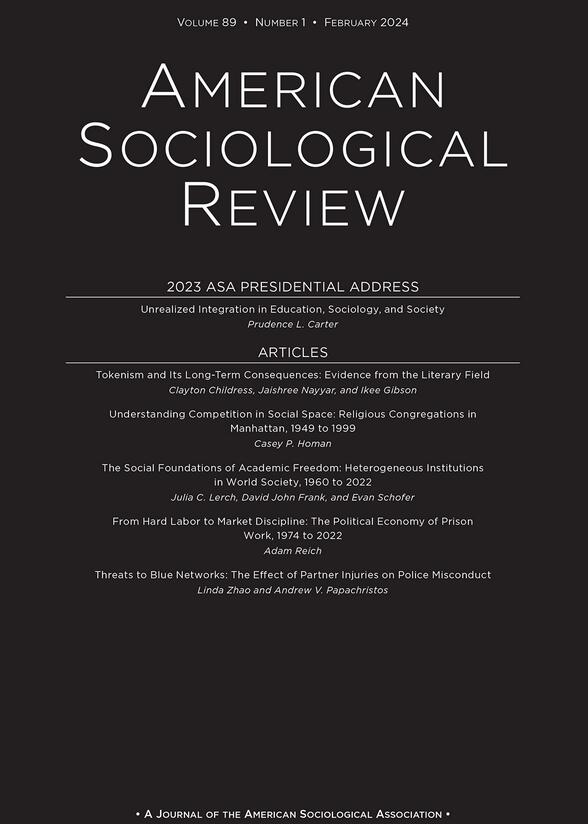文化关税:挪用和跨越文化界限的权利
IF 7.1
1区 社会学
Q1 SOCIOLOGY
引用次数: 0
摘要
为什么有些文化跨界行为被认为是允许的,而另一些则被斥为文化挪用?我们认为,对文化挪用的看法是随着文化杂食性作为一种主流的高地位消费形式的出现而形成的,这使得跨界成为一种文化资本的来源。因此,采用非本民族文化习俗的权利是根据人们假定的成本和收益来决定的。如果人们认为跨界行为贬低了目标文化的价值或以目标文化为代价获取了价值,他们就会对这种行为表示反对。我们将这一过程称为文化关税化。我们在主体间实验设计中检验了我们的理论,结果表明,根据社会身份或社会经济地位推断出的享有特权社会地位的个体,其跨越文化界限的规范性自由度较低。这是因为人们认为这些行为者贬低或利用了目标文化。虽然符号边界和文化差异理论与我们的研究结果不一致,但我们发现,对基于群体的社会流动性感到失望的美国人最有可能对文化越界行为感到愤怒。因此,我们认为文化关税是一种象征性的再分配。本文章由计算机程序翻译,如有差异,请以英文原文为准。
Cultural Tariffing: Appropriation and the Right to Cross Cultural Boundaries
Why are some acts of cultural boundary-crossing considered permissible whereas others are repudiated as cultural appropriation? We argue that perceptions of cultural appropriation formed in response to the emergence of cultural omnivorousness as a dominant form of high-status consumption, making boundary-crossing a source of cultural capital. Consequently, the right to adopt a practice from a culture that is not one’s own is determined on the basis of the costs and benefits one is presumed to accrue. People express disapproval at boundary-crossing if they believe it devalues or extracts value at the expense of the target culture. We call this process cultural tariffing. We test our theory in a between-subject experimental design, demonstrating that individuals who enjoy a privileged social position, as inferred from their social identity or socioeconomic status, have less normative latitude to cross cultural boundaries. This is explained by perceptions that these actors are either devaluing or exploiting the target culture. While symbolic boundaries and cultural distinction theories are inconsistent with our results, we find that Americans who are disenchanted about group-based social mobility are the most likely to be outraged by cultural boundary-crossing. Cultural tariffing, we therefore posit, is a form of symbolic redistribution.
求助全文
通过发布文献求助,成功后即可免费获取论文全文。
去求助
来源期刊

American Sociological Review
SOCIOLOGY-
CiteScore
13.30
自引率
3.30%
发文量
35
期刊介绍:
The American Sociological Association (ASA) is a non-profit membership association established in 1905. Its mission is to advance sociology as a scientific discipline and profession that serves the public good. ASA is comprised of approximately 12,000 members including faculty members, researchers, practitioners, and students in the field of sociology. Roughly 20% of the members work in government, business, or non-profit organizations.
One of ASA's primary endeavors is the publication and dissemination of important sociological research. To this end, they founded the American Sociological Review (ASR) in 1936. ASR is the flagship journal of the association and publishes original works that are of general interest and contribute to the advancement of sociology. The journal seeks to publish new theoretical developments, research results that enhance our understanding of fundamental social processes, and significant methodological innovations. ASR welcomes submissions from all areas of sociology, placing an emphasis on exceptional quality.
Aside from ASR, ASA also publishes 14 professional journals and magazines. Additionally, they organize an annual meeting that attracts over 6,000 participants. ASA's membership consists of scholars, professionals, and students dedicated to the study and application of sociology in various domains of society.
 求助内容:
求助内容: 应助结果提醒方式:
应助结果提醒方式:


